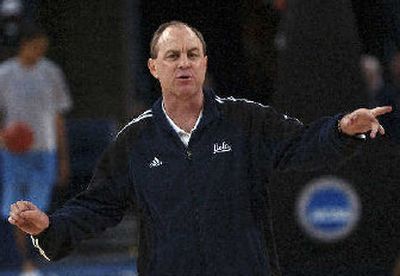Grad guys deliver good news

OAKLAND, Calif. – It’s Gonzaga vs. UCLA today to determine the fate of the free world, the Best in the West and the next survivor on the road to the Final Four.
Also to answer the burning question: Who had the best grad guy?
This was the message on Dan Fitzgerald’s voice mail this week, from the basketball coach who was both his assistant and successor at Gonzaga 25 years ago:
“Let’s make a bet – my grad guy against your grad guy,” rasped Jay Hillock. “For a paper route. And none of that cheap Rainier we used to have to drink when we didn’t make any money.”
For those unfamiliar with the old Zag lexicon, a “paper route” was an all-nighter – beer and basketball talk until the morning edition thudded against the front door. Rainier was the megabrew of the Northwest until the region was overrun by micros that require a second mortgage just to buy a pint. And a “grad guy” was a graduate assistant – an underpaid, overworked, generally exploited novitiate into the coaching game, and happy to be one.
That was Ben Howland at Gonzaga in 1982 when Hillock was the head coach, and that was Mark Few in 1990 under Fitzgerald
And this is the Grad Guy Game.
Two coaches from the humblest roots of Division I basketball. Few shared a house with fellow assistant Dan Monson and, later, Bill Grier, and took out student loans to live. Howland doubled as a greeter at Playfair Race Course – a better alternative to another job Gonzaga grad guys sometimes got “catching piss,” as Fitzgerald called it, for the horses’ drug tests. He did live in a two-bedroom apartment across Mission Park from John Stockton’s house, “with a beautiful walk-out deck overlooking the river for $195 a month.
“You don’t find that in LA every day,” he said.
Few, of course, long ago graduated from grad guy to the guy of Gonzaga basketball. His affiliation with the program now runs 17 years, and if he wasn’t the course architect he redesigned the holes – to the point that the Bulldogs are in their third NCAA Sweet 16 under his rule.
All of that seemed unlikely enough the year Few was hired – the Zags went 8-20 that season – yet may have been even more so the 10 months Howland spent at GU.
“You know how you have to have so many sports to qualify to be a Division I member?” Howland recalled this week. “Well, we had a golf team – and the budget was the golf tees.
“Mark has taken the program to a level most in the business would never have fathomed.”
Howland knew he wasn’t going to do when UCLA hired him away from Pitt two years ago. John Wooden guided UCLA to 10 national championships in 12 years, a standard that will simply never be equaled. So all Howland can do is try to reconnect to it. Last fall, he had his team over to his home for dinner and invited some 80 former Bruins – from Bill Walton to Marques Johnson to Don MacLean – to join them, “to embrace how lucky they are to be a part of such a special fraternity.
“And they get it. They totally get it.”
Grad guys have to get it, too, and certainly these two did – from knowing the dues that must be paid to how the game must be played to get to the top of their profession.
Friends from their days as assistants (“he has that witty, dry sense of humor – I like that,” said Few) who’ve even shared a trout stream, Few and Howland couldn’t be more different in many respects.
Few’s teams play with a wide-open offensive style that, frankly, is a much better fit for UCLA’s glitzy market than the hard-boiled, grind-it-out defensive game Howland prefers. Naturally, the ultimate yardstick for Howland will be whether that style can produce national titles, but even as the Bruins turn the corner it’s clear they haven’t restored the full buzz around the program.
And yet it’s a mistake to suggest that Few’s approach lacks toughness.
“Hey, I couldn’t bully him,” Fitzgerald recalled with a laugh, “and I tried.”
Still, that is more Howland’s persona. Even now, the story he loves best about his Gonzaga grad guy days is when he was pressed into duty going against Stockton in practice with the Zags’ second team. Howland can still name those backups from that year – Tim Ruff, Jason Van Nort, Dale Wiitala, Melvin Bonds – and even the point guard (Phil Tankey) from Barstow who bailed because he wasn’t tough enough to deal with the Spokane weather or the 10-mile conditioning run or Stockton’s presence.
It’s almost a metaphor for what seems destined to play out today – Howland’s Bruins, up in Gonzaga’s face.
“We played mostly half court so it was easier to hold, grab and foul as opposed to when you’ve got Johnny between the top of the keys,” he said. “When that happened, it was over for me.”
Not that he’s been telling his players that. Hillock, now the director of pro scouting for the Chicago Bulls, came to a UCLA practice recently and heard Howland pronounce that “on many days, I kept John Stockton scoreless – I kicked his ass.”
“I don’t remember that,” Hillock told the Bruins, to much laughter.
That’s OK. The memory can be a casualty of too many paper routes.